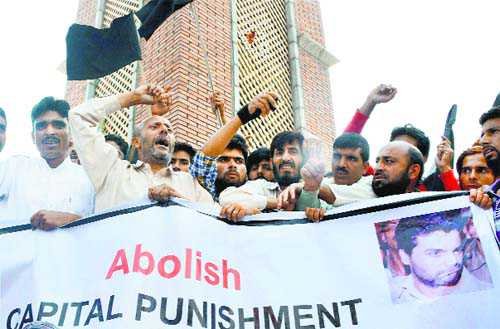More than 160 nations, Member States of the UN, have either abolished capital punishment or do not practise it. The death penalty has no place in the 21st century, especially in a civilised democracy. Why does India still insist on depriving its citizens of the fundamental right to life?
 |
| A protest in Srinagar against hanging of Mumbai blasts accused Yakub Memon. India must review its stance on the death penalty PTI |
WHAT says the law? You will not kill. How does it say it? By killing!” As Albert Camus says, capital punishment is perhaps the “most premeditated of murders.” Victor Hugo, in his condemnation of capital punishment, has perhaps best illustrated this fundamental dichotomy, underlying the imposition of death penalty in a civilised democracy. Taking of life, even when backed by legal process, is too absolute, too irreversible, for one human being to inflict on another. Echoing Hugo’s sentiments, the United Nations Secretary-General Ban Ki-Moon categorically stated that “the death penalty has no place in the 21st century.”
The UN Special Rapporteurs on judicial executions and torture, Christof Heyns and Juan Mendez, asserted that there is “no proof” that the death penalty has a deterrent effect, and many executions have resulted in “degrading spectacles.” Therefore, wisdom prevailed with the global community where more than 160 Members States of the UN, with a variety of legal systems, traditions, cultures and religious backgrounds, have either abolished the death penalty or do not practise it. Why does India, an admittedly democratic republic, still insist in depriving its citizens of their fundamental right to life, as exemplified by the execution of Yakub Memon?
Yakub was convicted of “criminal conspiracy to carry out terrorist act” in the devastating Mumbai blasts, where thousands of families lost their loved ones.
The Indian judicial response to Mumbai blasts culminated in the Supreme Court's unprecedented early morning hearing on July 30. The Court in this hearing rejected Yakub’s application seeking suspension of his execution and reaffirmed his death sentence. Yakub's execution compels India as people to revisit the issue whether death penalty is sustainable in a modern democracy. In 1980, the Supreme Court of India, in Bachan Singh vs. Union of India, observed that, “the normal rule is that the offence of murder shall be punished with the sentence of life imprisonment. The court can depart from that rule and impose the sentence of death only if there are special reasons for doing so. Such reasons must be recorded in writing before imposing the death sentence.”
The Supreme Court further also acknowledged that this requirement of “special reasons” was very loose and would allow courts to impose the death penalty in an arbitrary and whimsical manner. The Court, however, declined to list crimes that may fall in this category.
Paradoxically, however, this doctrine has enabled judges to impose death sentences in an arbitrary manner, reinforcing the deeply flawed character of capital punishment in India today. Perturbed by the numerous flawed, judicially sanctioned, executions, 14 eminent retired judges wrote to the President in 2012, pointing out that the Supreme Court had erroneously given the death penalty to 15 people since 1996, of whom two were hanged. The judges called this “the gravest known miscarriage of justice in the history of crime and punishment in independent India.”
Former President late Abdul Kalam, acknowledged that one of his most difficult tasks during his tenure, was deciding who deserved mercy or capital punishment. According to a study conducted during his tenure at Rashtrapati Bhavan, all pending cases of capital punishment had a socio-economic bias; the death penalty was mostly given to the poor.
India’s argument for death penalty is based on an assumption that its continuance prevents crimes of similar or serious nature, by instilling fear. There is no credible empirical evidence to show that death penalty acts as a deterrence, as noted in a UN resolution, adopted by the UN General Assembly in 2012. The lack of such deterrence is further demonstrated by the fact that the UN International Criminal Tribunals for former Yugoslavia (a region where more than 150,000 people died and about 4 million were displaced) and Rwanda (a country where about 1 million people died and 2 million were displaced), followed by the International Criminal Court, have not included death penalty as a mode of punishment. Even though these judicial institutions adjudicate on the most devastating and brutal crimes such as genocide, crimes against humanity, rape, and war crimes. India's legislative and judicial framework still resorts to this brutal punishment.
Insistence on retaining death penalty will cloud India's emerging clout in the global context — in which India harbours lofty global aspirations. It is way behind other countries in key current legal and moral trends on justice-related issues.
For example, the UN Moratorium on Death Penalty (last affirmed in 2012) notes that in a country like India, where trials are lengthy and decades may pass before actual execution of the verdict, those who await execution have died a thousand times already because of their anticipation of the final horror.
Similarly, in its 2012 Universal Periodic Review of India, the UN Human Rights Council recommended that India establish an official moratorium on executions and move towards abolishing the death penalty. The Council also recommended that India commute all death sentences into life imprisonment terms. However, India did not accept any recommendations regarding the death penalty, or abide by any international moratorium or resolution that requires it to eradicate death penalty from its legal order.
An outdated argument by India is that each nation has a “sovereign right” to determine its legal system, and to punish criminals according to its laws. This is grounded in a false assumption that such a right is absolute. By participating in a global legal system, ratifying treaties and submitting itself for global monitoring, India's “sovereign right” is fundamentally tempered. While this argument may sound politically impeccable in a national context for populist reasons; it displays blatant ignorance of a growing globaltrend towards the abolition of the death penalty. Unsurprisingly enough, in 2014, India, along with 37 other countries, voted against a UN General Assembly resolution calling for moratorium on death penalty. India aligned with Afghanistan, China, Iran, Iraq, North Korea, Pakistan, Saudi Arabia, Sudan, Syria, the USA. and Zimbabwe. An overwhelming majority of 117 countries supported the moratorium. Despite facing internal volatility, Algeria, Bahrain, Bosnia, Croatia, Israel, Myanmar, Rwanda, Serbia, Somalia, Tonga and Uganda joined the European Union in supporting the moratorium on death penalty. Some of these countries, that have undergone incessant war, genocide, mass rapes, sexual violence, and other forms of brutal crimes, at a much larger scale than India, have rejected the use death penalty. This display of solidarity for humanity, irrespective of geopolitical considerations, sends a powerful moral message to countries like India, which are still clinging to capital punishment. It is time to turn away from vengeance disguised as deterring punishment.
India's stance should not be defined by the actions or beliefs of the accused, but by the resilience of the human spirit, and diversity of civilisations of this land, where compassion for all is the foundation of the edifice of progress. A Private Member’s Bill for the abolition of death penalty by MP Kanimozhi is on the anvil. Under its objectives, capital punishment has been termed as “irreversible in a justice system susceptible to human failure”, “unjust” and “inhuman”. At the essence of all deliberations on death penalty, lies a fundamental question, as asked by Helen Prejean: “The important question is not, ‘Do they deserve to die?’ but ‘Do we deserve to kill them?’”
Gurdhyan Singh, former UN investigator in Yugoslavia & Rwanda, is Founder Executive Director of Global Justice Academy. Aratrika Choudhuri, is a IInd-year law student at West Bengal National University of Juridicial Sciences & Director Projects, Global Justice Academy. Views are personal
